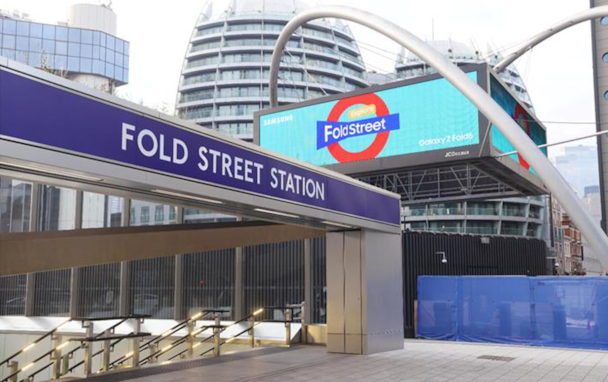Are TfL tube station takeovers the new ‘floating things down the Thames’?
Not everyone is happy about the recent craze of brands renaming London Underground stations, as we find out as part of The Drum’s Travel & Tourism Focus.

PR experts react to Old Street Station renamed to Fold Street Station / Samsung
Last month, Samsung renamed London’s Old Street station ‘Fold Street’ for a four-day tube takeover to promote its latest flip phone. The Samsung activation is the latest in a spate of London Underground station renames, leading some PR experts to ask whether the latest fad is akin to the clichéd floating of ads down the river Thames.
The trend goes back as far as 2015 when Transport for London (TfL) struck a deal for Canada Water station to be renamed ’Buxton Water’ to promote the brand’s sponsorship of the London Marathon, with Buxton Water ads positioned below the updated signage.
More recent examples include Southgate station becoming ‘Gareth Southgate’ station in celebration of the England manager, although paid for by Visa, while the Barbican station became ‘Barbiecan’ to mark the release of the Barbie movie.
Explore frequently asked questions
Backlash to the stunt kicked off last year when Bond Street was renamed ‘Burberry Street’ during London Fashion Week. Tube users complained to TfL that the signs were confusing to customers, while PR experts weighed in on the debate.
Communications advisor and ex-Barclays media relations exec Elizabeth Holloway took aim at the time by criticizing the lack of pun in ‘Burberry Street’ and the color choice (“It is not identifiable with Burberry nor TfL), as well as arguing it took over too much of the station by replacing useful signage. “It’s disappointingly lazy from the PR and marketing teams at Burberry who you would have thought have the means to pull together a more original idea,” she said during the activation.
Jay Young, the managing director of out-of-home agency Grand Visual, says station renames can be “highly valuable,” but only when they are “clever and executed with finesse,” adding that if forced and failing to invest in the delivery, “ideas will fall flat.”
Advertisement
Young applies the same rules to brands that wish to float their campaign down the Thames. “If it allows you to tell your creative story in a clever way and you know your audience will see it, do it. If not, throw the Post-It away and move on to the next idea in the brainstorm.”
For example, the renaming of Barbican station to ‘Barbiecan’ last year was widely praised at the time. Unlike ‘Fold Street’ and ‘Burberry,’ the Barbie logo was layered on top of the Barbican sign and the pun tapped into Barbie’s feminist status.
PR Stunt of the Day:
Barbican Station rebrands for launch of Barbie movie #barbie pic.twitter.com/geOhSD0wxq
— Andrew Bloch (@AndrewBloch) July 12, 2023
A key issue for PR experts is that a station rename leaves a pun to do a lot of work. According to Viola Hazlerigg, associate creative director at PR agency The Romans: “Great ideas are rarely created on the back of a pun because they lack executional depth and meaningful storytelling.” TfL takeovers unfortunately fall into this trap, she adds.
“A cute play on words and an expensive picture stunt that costs the world but, in my mind, rocks nobody’s, particularly those living outside London – as an industry, I think we’re more creative than that.”
Advertisement
Accessibility issues
There is another issue in all this: accessibility. The renaming of stations not only creates confusion for tourists but is also problematic for people with accessibility needs. The renaming of Old Street is of particular concern for patients using the station to access Moorfield Eye Hospital, for example.
Alison Kerry, the head of communications at disability equality charity Scope, says that familiarity of names and locations of stations is an important part of navigating cities. “Changing names can cause confusion for some disabled people,” she warns. She urges both TfL and the brands planning these stunts to “consult disabled people to understand their needs and make sure there is no negative impact.”
A spokesperson from Sense, a charity that supports people with complex disabilities, such as deaf and blindness, also called on TfL to “consider the needs of disabled people, including those with visual or neurological conditions, before proceeding with these stunts in future.”
A risk to TfL’s brand reputation?
By disregarding accessibility concerns, TfL risks damaging its brand reputation, argues Leanne Tritton, who is the founder and managing director of the PR agency ING Media.
“London Underground signage is renowned around the world for being excellent and signs are there for a reason – to help us find our way. When you start messing with that, you don’t really understand how difficult it can be for older people or tourists.”
Keen not to lay blame on the brands, Tritton thinks that if it’s up for sale, then why would they not? But she says it’s “poor form” from TfL and feels at odds with a company that spent £6.3m earlier this year on the London Overground renaming project. “The signage is hugely precious and really successful – people all over the try and replicate the signage on the London Underground – so why would you try and sell it for a couple of pieces of silver?”
Suggested newsletters for you
TfL is between a rock and a hard place, needing advertisers’ money to support its services while trying not to seem like it is selling out. It’s not known how much Samsung paid for Fold Street, but the Burberry deal made the train operator a reported £200,000.
The Drum went back to Holloway after this latest stunt with Samsung and was told: “We all know TfL needs the money, but this feels like selling its soul in multiple ways.” TfL could do long-term damage to its brand reputation if it continues with the station renames.
“Long after the media coverage, when it’s washed through the news cycle and is off social media, you are leaving people with negative sentiment, which is chipping away at the trust that TfL has built up and a reputation that loads of brands would kill for.” She adds: “It needs to be careful that in taking the corporate dollar it isn’t having a death by a thousand cuts impact over the longer term on its trust and reputation.”
Holloway was naively optimistic after the Burberry stunt. “The only positive is that the backlash might hopefully hasten the decline of this repeated lazy PR tactic,” she adds. Unfortunately, it looks like station renames might be here to stay.
